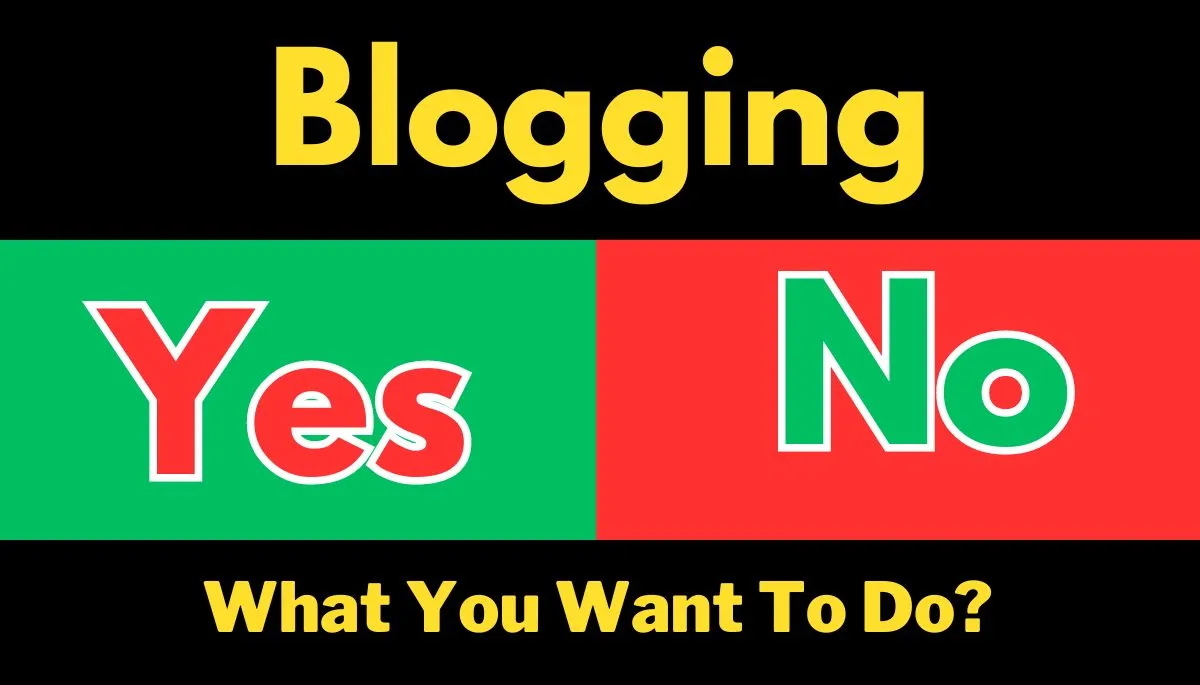Blogging -Yes Or No? What is Blogging, in a simple word, it’s a platform for anyone with a voice and an internet connection to share their thoughts, experiences, and passions with the world.
But in 2024, as social media giants reign supreme and content consumption habits evolve, the question arises is blogging still relevant? Is it time to say hello to a new era of expression, or should we bid farewell to this digital pioneer?
The Golden Age Blogging
The early days of blogging were a breath of fresh air.
Unburdened by the editorial control of traditional media, bloggers offered unfiltered perspectives on everything from politics and technology to cooking and fashion.
It was a democratization of information, a space where anyone could carve their niche and build a community.
This era saw the rise of blogging platforms like LiveJournal and Blogger, making it easy for anyone to create and publish content.
Blogs became a breeding ground for innovative ideas, fostering a sense of connection and global conversation.
Bloggers became thought leaders, influencers, and even entrepreneurs, monetizing their content and building loyal followings.
Impact Of Social Media in Blogging
However, the landscape began to shift with the rise of social media in the late 2000s. Platforms like Facebook and Twitter offer a more immediate and interactive way to share information.
Gone were the days of lengthy blog posts to audiences who craved bite-sized content, visually appealing imagery, and the constant stream of updates offered by social media.
The ease of sharing on social media also presented a challenge.
Blogging, once a haven for in-depth analysis and longer-form content, started to feel cumbersome.
Why write a detailed blog post when a quick tweet or catchy Instagram caption could achieve similar results?
Blogging’s Enduring Value: Importance of Blogging
In an era dominated by fleeting social media updates and viral content, blogging stands as a bastion of depth and substance.
While platforms like Twitter and Instagram prioritize brevity and instant gratification, blogging carves out a niche for meaningful exploration and in-depth discussion.
Blogs provide a platform for individuals and organizations to delve into topics with depth and nuance, offering insights that cannot be conveyed in a mere 280 characters or a filtered photograph.
Whether it’s analyzing complex issues, sharing personal experiences, or offering expert advice, blogs allow for a richer exchange of ideas.
One of the enduring values of blogging lies in its ability to foster community and connection.
Readers often seek out blogs that resonate with their interests and values, forming loyal followings around niche topics.
This sense of belonging and shared passion fosters meaningful interactions and dialogue among like-minded individuals.
Moreover, blogging offers unparalleled flexibility and creativity. Unlike traditional media outlets, bloggers have the freedom to explore unconventional or marginalized topics without the constraints of editorial oversight.
This freedom allows for diverse voices to be heard and for fresh perspectives to emerge.
Despite the rise of alternative forms of content consumption, blogging continues to thrive, proving its resilience in an ever-changing digital landscape.
Its enduring value lies not only in its capacity for depth but also in its ability to foster genuine connections, empower diverse voices, and inspire thoughtful discourse.
As long as there are individuals with stories to share and ideas to explore, the blogosphere will remain a vital space for meaningful engagement and expression.
The Future of Blogging: Adapting and Thriving
As the digital landscape evolves, the future of blogging lies in its ability to adapt to changing trends and technologies while maintaining its core strengths.
While some may speculate about the decline of blogging in the face of social media dominance, the truth is that blogging remains a resilient and versatile platform for content creators.
To thrive in the future, bloggers must embrace innovation and diversification.
This means leveraging emerging technologies such as video content, podcasts, and interactive features to engage audiences in new and exciting ways.
By incorporating multimedia elements into their blogs, creators can enhance the user experience and reach a wider audience.
Furthermore, adapting to shifting consumer preferences and SEO algorithms is crucial for sustaining relevance and visibility in a crowded online space.
This may involve optimizing content for mobile devices, prioritizing quality over quantity, and staying informed about the latest industry trends and best practices.
Additionally, collaboration and community-building will continue to be integral to the future of blogging.
By partnering with other bloggers, influencers, and brands, creators can amplify their reach and tap into new audiences.
Building strong relationships with readers through meaningful interaction and feedback fosters loyalty and ensures long-term success.
Ultimately, the future of blogging is bright for those who are willing to evolve, innovate, and adapt to the ever-changing digital landscape.
By embracing new technologies, staying agile, and fostering community, bloggers can continue to thrive and make meaningful contributions in the online world.
Conclusion
Blogging and social media are not mutually exclusive. They can co-exist and complement each other.
Social media can act as a springboard for driving traffic to longer-form blog content, while blogs can offer a more in-depth exploration of topics first introduced on social media platforms.
Saying hello to blogging and goodbye to social media is a false dichotomy.
The future lies in understanding the strengths of each platform and leveraging them to create a robust and engaging digital presence
The internet, after all, thrives on diversity of voices and expression. So, let’s raise a toast.

